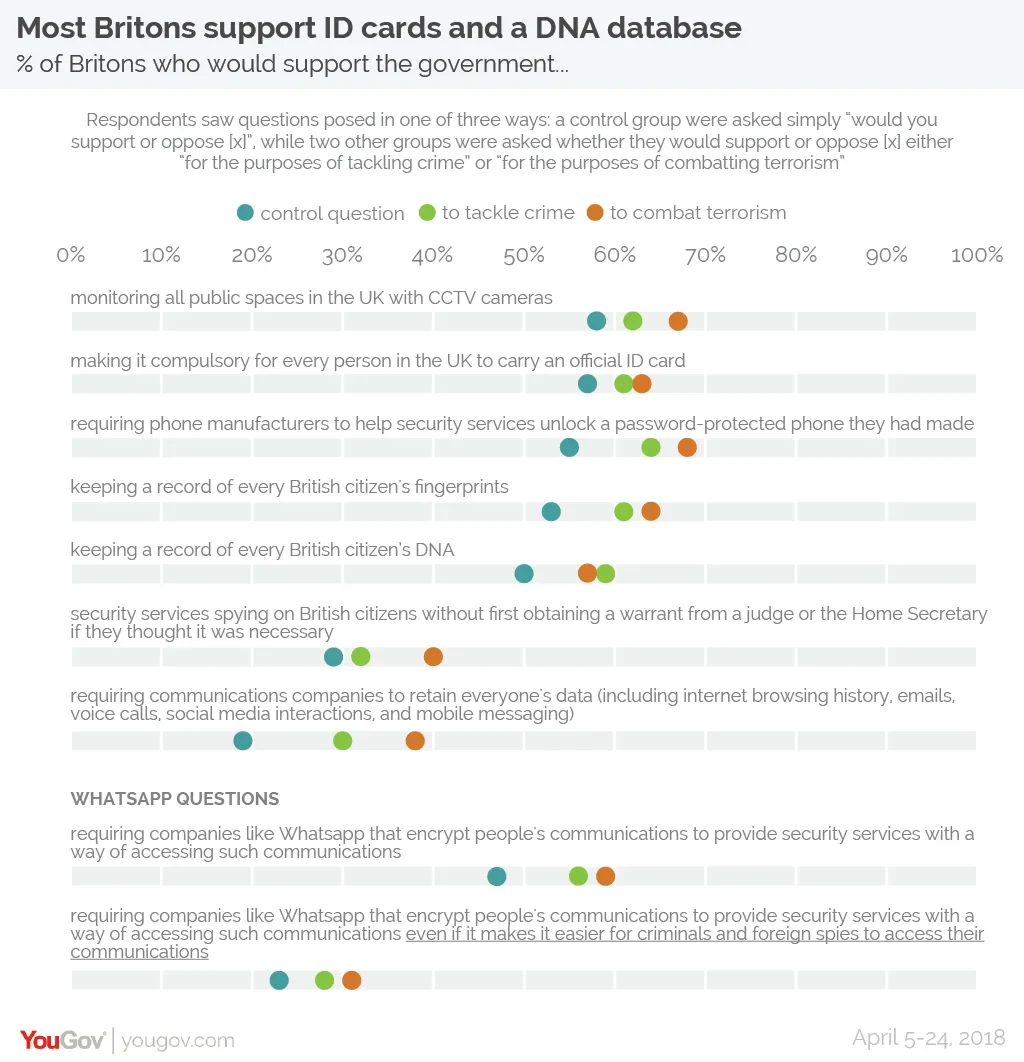YouGov finds high levels of support for granting extra powers and tools to the security services
This article originally appeared in The Times
Britain’s vote to leave the European Union has prompted the issue of ID cards to raise its head once more. At the end of April, Kenneth Clarke called for a rethink on ID cards, saying that immigration targets would be useless without them.
The introduction of ID cards hasn’t really been on the agenda since the mid-noughties, when they were among the many security-related rows dogging New Labour.
Now new YouGov research examines public support for extra powers and tools that could be granted to the security forces. Some are legacies from the New Labour era, others are more contemporary.
Given that such policies are often pitched to combat a range of issues – ID cards were lauded as tools to tackle fraud, terror and benefits entitlement – we split the sample into three groups of approximately 1,600 respondents each to see whether the way that the policies are pitched affects the level of public support.
The first group saw control questions which pitched the policies in isolation, while the second and third groups saw the same questions with additional context. So, for instance, the first group were asked “Would you support or oppose the government keeping a record of every British citizen’s DNA?”, among the second group the question was appended with “…for the purposes of tackling crime?” while the third group’s questions ended with “…for the purposes of combatting terrorism?”
Orwell be damned, Britons back CCTV in all public spaces
The survey reveals that most people would support the compulsory carrying of ID cards, with 57% support among the control group and 61-63% among those who were asked the crime/terrorism variants.
In fact, ID cards were the second most popular of the policies we tested. The only suggested policy more popular is the monitoring of all public spaces in the UK with CCTV cameras, which is supported by 58% of the control group, 62% of those asked the crime question, and 67% among the sample asked the terrorism questions.
The survey examined support for another policy the Labour government was pitching it the mid-noughties: a national DNA database with a record of every British citizen’s DNA. Half (50%) of Britons would support introducing such a database, with 57-59% support among those asked the crime or terrorism question.
A database for all British citizens’ fingerprints sees slightly higher levels of support – 53% of those asked the control question, 61% of those asked the crime question and 64% of those asked the terrorism question.
However, allowing the security services to spy on British citizens without a warrant if they thought it was necessary – effectively allowing spooks to operate in some cases without oversight – is notably less popular. It is only supported by 29% of those given the control question, 32% in the context of those tackling crime and 40% where it was presented as a method of combatting terrorism.
Whatsapp, San Bernardino and the Snooper’s Charter
While many of these security proposals have been around for more than a decade, the research also looked ones that have been floated to tackle more contemporary issues.
For instance, the majority of Britons (55%) support requiring phone manufacturers to unlock password-protected phones (something the FBI famously tried to get Apple to do in the wake of the 2015 San Bernardino terrorist attack). This figure increases when it comes to tackling crime (64%) or terrorism (68%).
And last year, in the wake of the Westminster terror attack, the then-Home Secretary, Amber Rudd, called for the security services to be given access to WhatsApp messages. At the time she was pilloried for seemingly not appreciating that in weakening encryption to allow security services to access messages, it may also mean that criminals and foreign agents could access the communications.
While on the face of it, many Brits would support the government having the power to access encrypted messages from WhatsApp and similar companies – 47% support under the control question, 56-59% under the crime/terrorism versions – this support drops off substantially when faced with the downside of weakening encryption.
When asked whether government should have such access even if it also makes it easier for criminals or foreign agents to access their communications, support for the policy falls to just 23% among those who saw the control question and 28-31% for those who saw the crime/terrorism versions.
The area that prompts the greatest opposition – and also the greatest divergence among the three groups – comes over the so-called “snooper’s charter”. These proposals would have required communications companies to retain everyone’s internet browsing history, emails, voice calls, social media interactions, and mobile messaging. Only 19% of the control group support this idea, but this rises to 30% among those who saw the crime question and 38% of those who saw the terrorism question variant.
Photo: Getty










